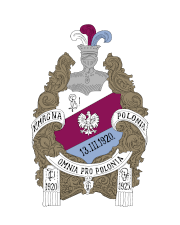More
The history of the oldest academic corporation in Poznań K! Magna-Polonia dates back to 1920. Then, on March 13, on the initiative of two philosophy students of Wszechnica Piastowska (as the university was called at that time), Franciszek Bohm and Leon Wojtaszewski, an ido-education organization called “Polonia” was established. It was modeled on the German Corps and Burschenschafts, however, rejecting any bursonade, considered devoid of sense and purpose.
The “Polonia” club found fertile ground and from the beginning met with great interest of students. The organization prevented the emergence of a severe gap which in the life of a young, existing since 1919, academic center would have been caused by the lack of a student association of a Christian and patriotic character, and at the same time apartist.
Soon after its establishment, the “Polonia” Circle established contacts with the “Polonia” Convention, the oldest Polish academic corporation, founded in 1828. in Dorpat and moved soon after the war to Vilnius. Photo 12th anniversary of K! Magna-Polonia. These contacts made it possible to see the identity of the ideology and tasks of both unions operating at the universities of the eastern and western borderlands of the emerging state. This resulted in the signing of the Unification Act on March 17, 1921, establishing K! Polonia with equal convents in Vilnius and Poznań, and seniority from 1828. This organizational form, due to the distance between the University of Poznań and the Stefan Batory University, created numerous difficulties in the practical functioning of the academic corporation, and also prevented the bonding of its members. Therefore, on February 8, 1924, the Vilnius Convention put forward a proposal to cancel the Unification Act. After quite long deliberations, during which the Association of Polish Academic Corporations took the floor, an agreement was reached and by the act of June 24, 1928, the Poznań convention (known from 1924 as K! Polonia-Posnaniensis) adopted the name K! Magna Polonia with seniority from 1920.
University life flourished in interwar Poznań. One of its manifestations was the activity of academic corporations. Out of over a dozen existing organizations of this type, K! Magna-Polonia was undoubtedly one of the largest (54 knights in 1934, 66 immediately before the war) and the most active. Not limiting herself to acting within her own ranks, she supported the creation of new corporations (including K! K! Silesia, Helionia, Masovia, Slensania, Icaria). K! Magna-Polonia took part in state and national ceremonies (including the transfer of the remains of Karol Marcinkowski to the ashes of the meritorious, the funeral of Rector Heliodor Święcicki, visits to Poznań by the President of the Republic of Poland Wojciechowski and Marshal Foch), took part (1921) in the congress establishing The Association of Polish Academic Corporations, delegated members to the plebiscite action in Silesia, formed the basis of one of the companies of the Academic Legion during the May coup. She organized well-deserved fame balls. A number of komiltons were involved in the work of many other university associations, e.g. Poznań Intercorporate Circle, Bratnia Pomoc, scientific circles.
Despite some limitations that academic organizations faced in the 1930s, by the end of the second decade it seemed that K! Magna-Polonia can confidently look into the future. In the spring of 1939 preparations for the celebration of the 20th anniversary planned for 1940 began.
Like many Polish plans, this one was thwarted on September 1. The coming war was to bring the death of 29 komiltons. The entry of the Germans into Poznań meant both the occupation of the Corporation’s quarters by the police and the loss of the archives stored there. In the following years, of course, there could be no question of any forms of Polish academic life. It did exist after 1944, but without the participation of corporations. Conventions and fidułki were usually held under the guise of a name day of one of the komiltons. Naturally, there was no talk of accepting new members or making public appearances.
The relative liberalization of the regime only allowed for the laying in of the building in 1983. in the cloisters of the church of O.O. of the Dominicans in Poznań, the epitaph plaque K! Magna-Polonia.
In 2003, a group of students of Poznań universities undertook, with the kind care and support of living philistines, activities aimed at reactivating the Corporation. On March 13, on the 84th anniversary of the uprising, 15 candidates became knights at a ceremonial commercial ceremony. K! Magna-Polonia lives, develops and flourishes, educating its members according to the motto ”Omnia pro Polonia”.
